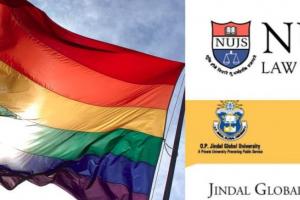section 377
 As it had widely signposted, the Supreme Court has taken a tragically overdue but also eventually progressive step by decriminalising consensual sexual acts between persons of the same sex today, which had infamously been prohibited under Section 377 of the Indian Penal Code. It held Section 377 to be arbitrary, irrational and unconstitutional.
As it had widely signposted, the Supreme Court has taken a tragically overdue but also eventually progressive step by decriminalising consensual sexual acts between persons of the same sex today, which had infamously been prohibited under Section 377 of the Indian Penal Code. It held Section 377 to be arbitrary, irrational and unconstitutional.
The Supreme Court on Monday referred to a larger Bench a writ petition filed by five petitioners to quash Section 377 of the Indian Penal Code which criminalises homosexuality.
A two-judge Supreme Court bench on Wednesday declined to hear a fresh petition by high profile celebrities challenging criminalisation of consensual gay and lesbian sex, and the matter was referred to Chief Justice TS Thakur.
India isn’t the only country currently wondering about “carnal intercourse against the order of nature”, to quote section 377 of the IPC Apparently, in the US a piece of semi-news has gone viral that Michigan has made oral and anal sex illegal. That’s not quite true - the Michigan legislature when amending the penal code simply didn’t remove the outdated section:
When the Supreme Court decided Lawrence v. Texas by a 6-3 margin in 2003, making oral and anal sex legal nationwide, 14 states still had anti-sodomy laws on the books.
The decision (which has a fascinating history) invalidated those laws. Still, 12 states, including Michigan, never repealed them.This isn’t necessarily unusual. Legislators love passing laws, but they’re much less likely to go back and clean up old ones. State criminal codes are overstuffed with outdated, unconstitutional, unenforceable laws of all kinds, and Michigan is no exception.
Adultery is technically a felony in Michigan. So is “seducing and debauching an unmarried woman.” The state’s penal code says unmarried people who live together can be fined or put in prison.
Read more at Vox.
 The curative petition of Yusuf Mohsin Nulwala, a convict in the 1993 Mumbai blast case, will be heard by the Supreme Court tomorrow by the bench comprising the three senior-most Judges, namely, the CJI, TS Thakur, and justices Anil R Dave and JS Khehar beween 1:40 and 1:45 pm in their chambers tomorrow.
The curative petition of Yusuf Mohsin Nulwala, a convict in the 1993 Mumbai blast case, will be heard by the Supreme Court tomorrow by the bench comprising the three senior-most Judges, namely, the CJI, TS Thakur, and justices Anil R Dave and JS Khehar beween 1:40 and 1:45 pm in their chambers tomorrow.
 Chief Justice of India (CJI) TS Thakur, and justices Anil R Dave and Jagdish Singh Khehar, will hear the section 377 curative petition today at 3pm in the Supreme Court.
Chief Justice of India (CJI) TS Thakur, and justices Anil R Dave and Jagdish Singh Khehar, will hear the section 377 curative petition today at 3pm in the Supreme Court.
Former Delhi high court Chief Justice and chairperson of the Law Commission AP Shah criticised the Supreme Court for overturning Delhi high court judgment on decriminalising homosexuality and commented that the Supreme Court bench had “ignored the counter-majoritarian role of the judiciary” while speaking at the Tarkunde Memorial Lecture at the India International Centre, reported The Indian Express.
He expressed his concern over the Supreme Court’s decision which ignored a violation of fundamental rights and chose to stick with outdated laws. He was quoted as saying:
The Supreme Court neither engaged with the change in English law nor with changing social mores globally. Instead, the court’s views suggest that the legitimacy of a law is unquestionable, regardless of its origins in an imposed foreign morality or contrary evidence, scientific or otherwise. In fact, the high court’s extensive consideration of international developments were brushed aside by the Supreme Court.
Observing that either the judiciary or the legislature have the power to repeal Section 377 of Indian Penal Code that criminalises intercourse against the course of nature, he added: “It cannot be a never-ending game of toss and catch between the legislature and the judiciary. Someone must take up the gauntlet. Both the legislature and the judiciary need to act independently, but act now they must.”
DV Sadananda Gowda, commenting on the US Supreme Court’s national country-wide legalisation of gay marriage last week, said that the government could de-criminalise gay sex under section 377 of the Indian Penal Code and might even consider gay marriage as an option.
“The mood appears to be in favour of it. But it can be done only after widespread consultations and taking all views into account,” he told the Economic Times.
Update: Gowda has told ANI News that he was "totally misquoted": "When I was asked about the judgment that was given by the US court, I said that it is not an easy task in our country. So, the people of that country might have accepted it but here it has to be widely debated. Only then can something be done. Otherwise, it is not an easy task. So, we have no idea of scrapping or doing anything about [Section] 377."
Hat-tip: @mohitsingh8 and @sayantan_b on Twitter
 In a landmark judgement, the US Supreme Court ruled on Friday that gay people can marry nationwide and states cannot ban same-sex marriage - an issue that divides America and India.
In a landmark judgement, the US Supreme Court ruled on Friday that gay people can marry nationwide and states cannot ban same-sex marriage - an issue that divides America and India.
Apex court lawyer Suhaas Joshi has filed a criminal complaint in a Delhi metropolitan court against online shopping site Snapdeal and a sex-toy e-commerce website that closed down a month ago, arguing that they violated section 377 of the IPC that bans “carnal intercourse against the order of nature”, reported QZ.
Joshi, who told Quartz that he “only wanted to test the law” so that “either parliament should debate and discuss the issue or state should come to the rescue of all those affected”, also complained under the IPC’s section 292, 292A, 293 and 294, dealing with public obscenity. The court asked the police to investigate the matter on 5 February.
Joshi singled out products such as “anal lubes and massagers that are shaped like the male phallus”, clarifying that he was not against homosexuality but wanted to point out the double standard of the law banning the sexual activity, while allowing for the sale of items used in such activities.
A Bangalore employee of Infosys has been arrested under section 377 of the Indian Penal Code for allegedly having sex with another man, which was recorded by his arranged-marriage-wife of six months on a hidden camera, reported the Bangalore Mirror.
The Supreme Court reinstated the colonial-era section 377 provision earlier this year after the Delhi high court had struck down the law, which bans “carnal intercourse against the order of nature” and has been used by police to harass the gay community.
 The upcoming curative petition against the reversal of Naz has equally, if not more, dismal prospects of bringing a desired result as the review of that judgment which was dismissed unsurprisingly, argues Delhi advocate Chetan Gupta.
The upcoming curative petition against the reversal of Naz has equally, if not more, dismal prospects of bringing a desired result as the review of that judgment which was dismissed unsurprisingly, argues Delhi advocate Chetan Gupta.
Nalsar Hyderabad student Anindita Mukherjee analyses today’s Supreme Court judgment recognising the “third gender” and points out what the apex court may have missed.
The Supreme Court has ruled that all government departments must recognise a third gender, and not discriminate against transgender people in the provision of services.
 Countering Alok Prasanna Kumar’s counter-argument earlier this week, Sudhir Krishnaswamy and Shishir Bail counter that a presidential reference remains the best course of action to remedy the Supreme Court’s reversal of the Delhi high court’s judgement that struck down section 377.
Countering Alok Prasanna Kumar’s counter-argument earlier this week, Sudhir Krishnaswamy and Shishir Bail counter that a presidential reference remains the best course of action to remedy the Supreme Court’s reversal of the Delhi high court’s judgement that struck down section 377.
Advocate Alok Prasanna Kumar argues against a presidential reference as a tool to cure Koushal v Naz, as suggested in a previous column by Sudhir Krishnaswamy and Shishir Bail.
Today the Supreme Court has rejected a review of its own Section 377 judgment. A curative petition too will likely end in failure, given the high rate of rejection for review and curative petitions. But while there is much wrong with the Koushal v Naz judgment, we should not give in to the temptation that Section 377 cannot be struck down by a Constitutional Court and must instead be left to Parliament to repeal. For one, there isn’t even a cogent argument to that effect you will find on reading the Supreme Court of India’s judgment in Koushal.
Supreme Court justices HL Dattu and Sidhansu Jyoti Mukhopadhaya have rejected a number of review petitions of its late 2013 judgment that effectively re-criminalised homosexual intercourse.
The bench said in its order: “We have gone through the Review Petitions and the connected papers. We see no reason to interfere with the order impugned. The Review Petitions are, accordingly, dismissed.”
The December 2013 Supreme Court bench of Dattu and Mukhopadhaya, which was headed by Justice GS Singhvi when it handed down its judgment on the day Singhvi retired, had overturned the Delhi high court's judgment that held section 377 as unconstitutional.
Section 377 of the Indian Penal Code makes “carnal intercourse against the order of nature with any man, woman or animal” punishable with a maximum life prison sentence.
[Read the Supreme Court's December 2013 judgment]
A curative petition will likely follow now.